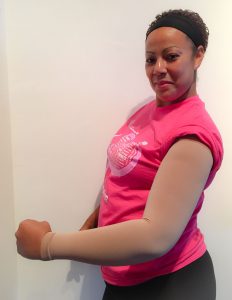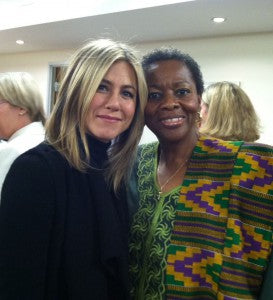
Written by Jennifer Edmondson and Teresa Iattoni
Chances are, unless you or a loved one has Lymphedema, you might not have ever heard of this serious and potentially life-threatening disease. Jennifer Edmondson, JD, a secondary Lymphedema survivor, and Teresa Iattoni, DPT, CLT, CES, certified Lymphedema therapist, begin a new series of articles about Lymphedema, and share important information and valuable insights from the perspectives of a Lymphedema survivor, and a healthcare professional specializing in Lymphedema care.
Tell us about yourselves.
Jennifer: I’d never heard of Lymphedema before my diagnosis, which followed my surgeries and treatments for metastatic breast cancer. I feel fortunate that Teresa has been my certified Lymphedema therapist for the past 11 years.
I’m a Wisconsin attorney, small business owner with my husband John, mom to Catie, and founder and CEO of Health, Education & Welfare (HEW), a nonprofit that provides new and innovative programs and services relating to Lymphedema. HEW’s Advances in Lymphedema Care conference is Wisconsin’s first and only Lymphedema conference for survivors and healthcare professionals, providing direct access to Lymphedema experts and national manufacturers of Lymphedema products. Teresa is the conference mastermind. https://www.lebontadipio.com/all-things-Lymphedema
In 2019, HEW established The Compression Garment Fund, which is Wisconsin’s first and only financial aid program helping Lymphedema survivors obtain their medically necessary compression garments. The Fund was started after Teresa raised awareness of the lack of coverage by private insurance, Medicare, and healthcare systems. Since 2019, HEW has provided over $6,000 in compression garments to Lymphedema survivors in need. lebontadipio has been our Catalyst level supporter helping to make The Fund possible.
Teresa: I became a “lymphomaniac” in 2004, when I attended my first Lymphedema continuing education class. After my first experience of learning and treating individuals impacted by Lymphedema, I was hooked and have attended basic and advanced training in the Leduc Method of Lymphedema Management, national and international Lymphedema conferences, and multiple virtual educational events. I completed my transitional doctoral degree in physical therapy in 2020. I view participating in continuing education as inspiring. It has been my pleasure to work with Jennifer in planning and presenting HEW’s Advances in Lymphedema Care conferences. Currently, I work providing care for cancer survivors, patients diagnosed with orthopedic conditions and/or Lymphedema, and have a special interest in all things equestrian.
What is Lymphedema?
Lymphedema has been defined as an accumulation of protein-rich fluid in an individual’s tissue spaces3. It’s a potentially life-threatening disease of our bodies’ lymphatic system, which is an essential part of our immune system. There is no known cure for Lymphedema. Once you have it, you have it for the rest of your life. And left unmanaged and uncontrolled, Lymphedema can cause permanent damage to the immune system, lead to illness, pain and suffering requiring hospitalization, and possibly death.
Lymphedema affects an estimated 10 million Americans – more than the combined totals of Americans living with AIDS, ALS, Alzheimer’s, MS, Muscular Dystrophy, and Parkinson’s1, and nearly 250 million worldwide3a. Yet the general public is relatively unaware of the disease, and healthcare providers who do not specialize in Lymphedema tend to lack accurate information, such as how to recognize the early signs.
When our lymphatic system works the way it’s supposed to work, we barely notice what’s happening – we don’t feel it working. It just does. The lymphatic system includes: a large vascular system which travels throughout the entire body, thymus, spleen, and bone marrow2. The function of the lymphatic system consists of the following; 1) regulation of fluid balance, 2) transportation of immune cells, 3) removal of waste materials and destroyed bacteria, which are then processed by the kidneys or liver, and 4) fat cell digestion in the intestines2. In general, the lymphatic system keeps every thing in balance, fights infection, and cleans out waste materials.

Why did it happen to me?
People are either born with Lymphedema (primary Lymphedema), or develop secondary Lymphedema after sustaining a traumatic injury to the body or having surgery and treatment for cancer. In fact, approximately 68% of secondary Lymphedema patients are diagnosed following treatment for cancer4. Factors that increase an individual’s risk of developing Lymphedema include:
• an elevated body mass index above 30
• removal of lymph nodes
• Taxane chemotherapy
• radiation therapy5
Of the individuals who will be diagnosed with secondary Lymphedema, 80% have developed Lymphedema during the first 3 years after cancer treatments6. Although the highest percentage of cases occurs in those first years, secondary Lymphedema risk is life-long. Breast cancer survivors who have experienced a skin infection, on the arm or breast, on the same side from which of lymph nodes were removed have been found to have an associated onset of Lymphedema7.
Jennifer: I had three of the four factors listed above. I had all left axillary lymph nodes removed; Taxane was one of the three chemo drugs I got; I had radiation therapy. My Lymphedema symptoms appeared after my reconstruction surgery.
Teresa: Over the last 24 years of being a physical therapist, it has become evident to me that addressing any symptoms early results in better overall outcomes. My patients who were able to initiate Lymphedema management in the first month after initial symptoms have been able to achieve improved size of their involved body region, minimize risk for skin infections and other complications associated with untreated Lymphedema. If you have not been able to receive treatment in that first month, don’t give up…I have had multiple patients who have not had treatment for years who have had excellent results with comprehensive Lymphedema treatment.
What are the signs I might have Lymphedema?
At the first signs of the symptoms listed below, you should contact your medical provider as soon as possible. Ideally, you should be examined by a certified Lymphedema therapist or medical professional who is trained and specializes in Lymphedema Management. The symptoms are:
• A feeling of heaviness or tightness in the limbs or other body part
• increased size in the limb or other body part
• clothing or jewelry feels tighter than usual
• aching in the swollen region
• fever
• the limb or other body part is hot to the touch, and the skin has a blotchy redness
It’s possible that these symptoms could be caused by other conditions (not Lymphedema), which is why it’s important to seek out medical care as soon as possible. Examples of other conditions that can cause swelling include: venous insufficiency/varicose veins, diabetes mellitus, blood clots, congestive heart failure, pulmonary hypertension, kidney disease, gout, and allergic reactions.
Does early detection and early treatment of Lymphedema matter?
Yes! Starting treatments early (ideally in the first weeks after first symptoms) for Lymphedema has been found to be imperative to decrease the severity of symptoms and potentially prevent permanent Lymphedema. Traditionally, Lymphedema treatments are provided by occupational and physical therapists who have received advanced training and certification to provide manual lymphatic drainage, multi-layer bandaging, fit and recommend appropriate Lymphedema garments/pumps/bandaging supplies, education in appropriate risk reduction practices, and home exercise programs.
Teresa: Early detection, intervention, and treatment are incredibly important to a patient’s quality of life. For instance, the best chance to resolve Lymphedema is addressing it during the initial stages within the first month of symptoms. I believe knowledge is power, and if at all possible, if an individual is at risk of Lymphedema, ask your provider for a referral for education and risk reduction strategies. If your medical provider is not comfortable with that plan, monitor your symptoms of heaviness, aching, fullness, tightness, or indentations from your clothing and at the first signs ask for a referral to a Lymphedema therapist.
Jennifer: Early detection and treatment has made a world of difference for me. I will always be grateful to a visiting nurse who checked on me after my double mastectomies. Well before I had any Lymphedema symptoms, the nurse told me to consult with a certified Lymphedema therapist as soon as possible, so they could measure my left arm to get a baseline measurement, to be checked for any signs of Lymphedema, and for me to learn about the symptoms. I had been told that my chances of getting Lymphedema were unlikely. We now know that was incorrect information – because I had all the left axillary lymph nodes removed, and chemo, radiation and reconstruction surgery, I actually was at high risk of developing Lymphedema.
Because I was able to consult with Teresa before I ever had any symptoms, I was able to learn about Lymphedema, and the signs to look out for. I became a regular patient of Teresa’s, who gave me important advice and care. When Lymphedema symptoms arose following my reconstruction surgery, I knew right away what was happening, and I was able to start treatment right away. I’ve been able to keep my Lymphedema under good control. It has not stopped me from doing things that I want to do.
As a result of my own personal experience, I believe that early detection and treatment would help prevent unnecessary pain and suffering, and also prevent the additional, expensive costs of medical treatment and hospitalization.
If it were up to me, every person who undergoes any type of surgery or who experiences physical trauma to the body would be referred to a certified Lymphedema therapist, for an initial examination to check for signs of Lymphedema, and also for patient education about what to look out for.
Is Lymphedema really such a big deal?
Teresa: Yes, it is a very big deal. Lymphedema is an incurable and potentially life-threatening disease. Left unmanaged and uncontrolled, Lymphedema can permanently damage the lymphatic vessels, which can lead to health complications such as cellulitis infections, pain and suffering, amputation, and sepsis; repeated hospitalizations, and possible death. Each repeated bout with cellulitis infections increases the risk of permanent damage to the immune system, making the person more vulnerable to other life-threatening illnesses.
Unmanaged Lymphedema has resulted in several of my patients having severe cellulitis infections requiring hospitalization for 5-7 days, increased size of involved extremities to be more than double the size of their non-involved limb, and extensive skin changes/fibrosis.
Jennifer: I’ve never had to be hospitalized for Lymphedema, but, there were years when I had multiple cellulitis infections, and that was very scary. I’d have a very high fever, flu-like symptoms, and my arm would swell up and be hot (from the infection), and I’d develop a rash. Each time I had a cellulitis infection, I was afraid that permanent damage would be done to my lymphatic vessels, and that I might develop sepsis. I remember a woman who had Lymphedema told me that she had been hospitalized numerous times for cellulitis infections, and each time she was wheeled into the hospital, she was afraid she was going to die there.
Can I have a normal life?
Yes! Lymphedema is a manageable condition. You can lead a fulfilling life by making modifications to keep your Lymphedema in check. It’s a ‘new normal’. Surrounding yourself with supportive family, friends, and medical providers is essential (physician, nurse practitioner, Lymphedema therapist, and holistic providers).
Teresa: At one of the most inspiring conferences I attended, I had the opportunity to listen to keynote speaker Deborah Cordner Carson tell her story of managing her Lymphedema and participating at a high level of CrossFit. Check out her story from 2012, https://games.crossfit.com/article/persistent-deborah-cordner-carson. A Lymphedema diagnosis can be disheartening and make you feel like the world is caving in on you, but keep on going, and researching ways to manage your symptoms to return to the things that your love.
Jennifer: I encourage my fellow survivors to keep hope alive. Try activities you enjoyed before your diagnosis. My surgeries and cancer treatments had left me very weak. So I signed up for the LiveStrong program at my local Y. Then I returned to ballet classes, tennis, and gardening. And walks with my daughter along the river. Don’t be afraid to try. If something doesn’t work out, that’s okay – look for something else, and keep looking until you find the activity that’s right for you. The key is to keep on moving, and moving forward.
- - - - - - - - - - - - - - -
References:
1. Lymphedema Education and Research Network. (2019). Ten Things Ovarian Cancer Flyer [pdf]. Retrieved from https://lymphaticnetwork.org/images/uploads/LERN_Ten_Things_Ovarian_Cancer_Flyer.pdf
2. Ridner, S. (2013). Pathophysiology of Lymphedema. Seminars in Oncology Nursing, 29(1), 4-11. https://doi.org/10.1016/j.soncn.2012.11.002
3. Foldi, M., Foldi, E., & Kubik, S. ed. (2003) Textbook of Lymphology for Physicians and Lymphedema Therapist. Germany: Urban Fischer
3a. Schulze, H., Nacke, M., Gutenbrunner, C., Hadamitzky, C., Worldwide assessment of healthcare personnel dealing with lymphoedema. https://www.ncbi.nlm.nih.gov/pmc/articles/PMC5901432/
4. Lymphedema Treatment Act. (2017). Lymphedema Not One Disease [pdf]. Retrieved from http://Lymphedematreatmentact.org/wp-content/uploads/2017/01/Lymphedema-Not-One-Disease.pdf
5. Ayre, K., & Parker, C. (2019). Lymphedema after treatment of breast cancer: a comprehensive review. Journal of Unexplored Medical Data, 4:5. https://doi.org/10.20517/2572-8180.2019.02
6. Petrek, J. A., Senie, R. T., Peters, M., & Rosen, P. P. (2001). Lymphedema in a cohort of breast carcinoma survivors 20 years after diagnosis. Cancer, 92, 1368-1377. https://doi.org/10.1002/1097-0142(20010915)92:6<1368::aid-cncr1459>3.0.co;2-9.
7. McLaughlin, S., Wright, M., Morris, K., Giron, G., Sampson, M., Brockway, J. & VanZee, K. (2008). Prevalence of Lymphedema in women with breast cancer 5 years after sentinel lymph node biopsy or axillary dissection: objective measurements. Journal of Clinical Oncology, 26(32), 5213-5219. https://doi.org/10.1200/JCO.2008.16.3725


 In light of this, BrightLife has partnered with the Susan G. Komen Foundation to provide compression armsleeves to those who may not otherwise be able to afford it. We will be providing free compression sleeves to patients at six different Komen grantee organizations here in Washington, D.C. These awesome organizations will help the patient measure for the correct fit and find the best armsleeve to help manage their symptoms. They will then send this information to us, and we ship out the armsleeve free of charge the same day. Check out Francia, pictured on the left, happily showing off her new compression armsleeve!
In light of this, BrightLife has partnered with the Susan G. Komen Foundation to provide compression armsleeves to those who may not otherwise be able to afford it. We will be providing free compression sleeves to patients at six different Komen grantee organizations here in Washington, D.C. These awesome organizations will help the patient measure for the correct fit and find the best armsleeve to help manage their symptoms. They will then send this information to us, and we ship out the armsleeve free of charge the same day. Check out Francia, pictured on the left, happily showing off her new compression armsleeve!



